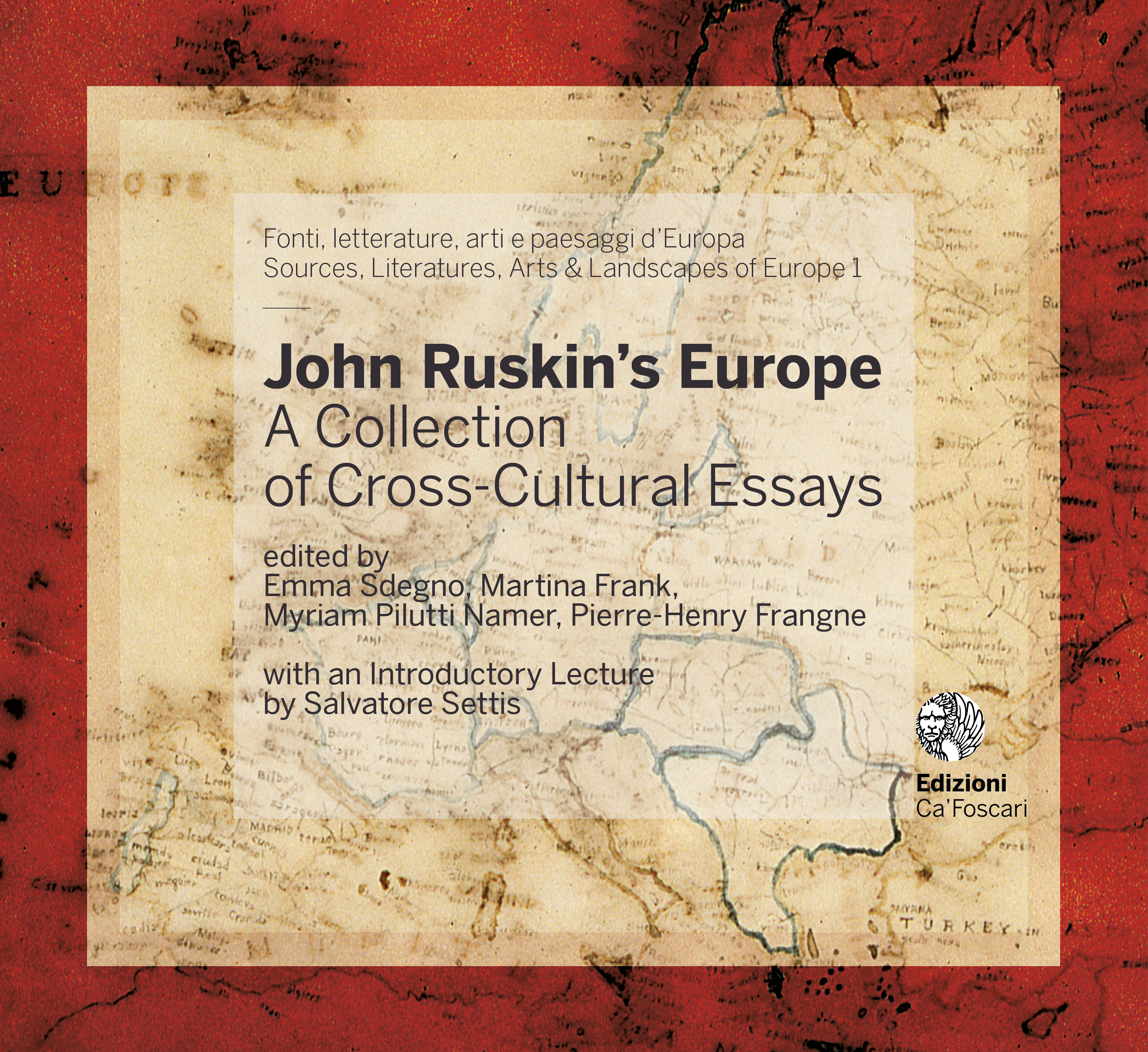
- search 3238 views
- file_download 1109 download
- keyboard_capslockmetadata
-
mark_email_readIscriviti alla newsletter
John Ruskin’s Europe. A Collection of Cross-Cultural Essays
With an Introductory Lecture by Salvatore Settis
edited by
abstract
Ruskin’s work is strongly embedded in the broad European context, marking an important moment in the movement for the establishment of a community culture and spirit. The essays collected here intend to place the theme of Ruskin’s fruitful and vital relationship with Europe at the centre of a critical reflection, opportunities for an in-depth study and a discussion on issues related to aesthetics, the protection of tangible and intangible heritage, cultural and literary memory. By bringing to the attention of the scientific community the multiple aspects – geographic, historical-artistic, critical-aesthetic, literary, socio-political – of Ruskin’s work from inter- and transcultural perspectives, the volume aims to (re)discover a deliberately European Ruskin and to stimulate new research paths.
-
Keywords keyboard_arrow_down
Ornament • Viollet-le-Duc • Art Market • Reception of Classical Antiquity • Guild of St George • French Gothic architecture • Aratra Pentelici • Optical thinker • Russia • Taishō Era • Cardinal Manning • Venice • Nationalism • Anglo-Austrian Cultural Relationship • State Museum Berlin • Rasu Chijin Kyōkai (Rasu Farmers Association) • Intentionality • Arts and Crafts Movement • Hungary • Dante Alighieri • Design • Sketching • Gustav von Waagen • Magazine “The Studio” • Italian Folk poetry • Potsdam Friedenskirche • Old Road • Comparatism • Charlotte Broicher • Liberal Italy • Political economy • Shelter • Marx • Adult Education • Kenji Miyazawa • Modern Japan • Working Men’s College • Roadside Songs of Tuscany • Lev Tolstoj’s reception in Italy • Robert de la Sizeranne • Drawing • Europe awareness • Tourism • “Grand contexte” • Degrowth • La Bible d’Amiens • Klosterhof Glienicke • The Bible of Amiens • Liberalism • National heritage • Cultural Heritage Conservation • Yule family • Lady Gregory • Palermo • Phenomenology • Anti-capitalism • Johan Joachim Winckelmann • Islam • Francesca Alexander • Queen of the Air • Social change • Roads • Travel • Anti-machinism • Architecture • Interpretation • François-René de Chateaubriand • Samuel Taylor Coleridge • Ruskin’s reception • Gothic cathedrals • Transcultural history • Calais’ experience • Lady Layard • Abandonment • Museums of Venice • Czech • Aesthetics • Amelia Sarah Levetus • Anglo-Italian Cultural Relationship • Francesco Pajaro • Composition • Ruins • Il Marzocco • Memory • Archival documents • Nōmin-Geijutsu (Peasant Art) • Frédéric Ozanam • Observation • Turner • Carl Justi • Sicily • William Wordsworth • Democratic Liberal • Fioretti di San Francesco • Socialism • Giacomo Leopardi • Medieval Monuments in Italy • Spuybroek • European aesthetics • Radicalism • Humanity • Marcel Proust • Byzantine Sculptures • Restoration • Unto this Last • Arts and Crafts Schools • Imaginary geography • Aesthetics of the 19th and 20th century • Orient • Poland • Reception of Ancient Greek Art • Religious monuments • Gothic • Christian socialism • Europe • Disorientation • Medieval Art • Novelty • Bridges • Leo Tolstoy • Photography • Dwelling in • Marxism • Version • Ruskin • Cultural heritage • John Ruskin • Translation • Perception • The Story of Ida • Travel writing • Social reform • Legacy • Anti-industrialism
Table of contents
- search 338 view
- file_download 48 download
- search 205 view
- file_download 15 download
Ruskin: A European Aesthetic?
- search 247 view
- file_download 24 download
- search 420 view
- file_download 33 download
- search 448 view
- file_download 26 download
- search 378 view
- file_download 36 download
- search 367 view
- file_download 23 download
- search 435 view
- file_download 32 download
The Centres of Ruskin’s Europe
- search 293 view
- file_download 17 download
- search 278 view
- file_download 25 download
- search 333 view
- file_download 23 download
- search 462 view
- file_download 53 download
- search 393 view
- file_download 35 download
- search 326 view
- file_download 15 download
Literary Intersections
- search 387 view
- file_download 26 download
- search 716 view
- file_download 83 download
- search 362 view
- file_download 25 download
- search 433 view
- file_download 38 download
- search 306 view
- file_download 17 download
- search 316 view
- file_download 21 download
Culture and Society in Europe According to Ruskin
- search 391 view
- file_download 22 download
- search 421 view
- file_download 27 download
- search 293 view
- file_download 27 download
Appendix
- search 253 view
- file_download 17 download
